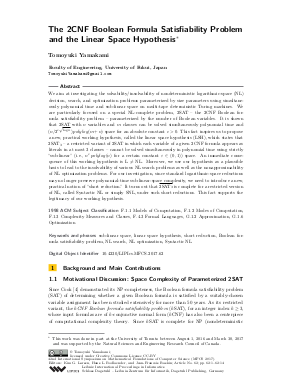The 2CNF Boolean Formula Satisfiability Problem and the Linear Space Hypothesis
Author Tomoyuki Yamakami
-
Part of:
Volume:
42nd International Symposium on Mathematical Foundations of Computer Science (MFCS 2017)
Part of: Series: Leibniz International Proceedings in Informatics (LIPIcs)
Part of: Conference: Mathematical Foundations of Computer Science (MFCS) - License:
 Creative Commons Attribution 3.0 Unported license
Creative Commons Attribution 3.0 Unported license
- Publication Date: 2017-12-01
File

PDF
LIPIcs.MFCS.2017.62.pdf
- Filesize: 488 kB
- 14 pages
Document Identifiers
Subject Classification
Keywords
- sub-linear space
- linear space hypothesis
- short reduction
- Boolean formula satisfiability problem
- NL search
- NL optimization
- Syntactic NL
Metrics
- Access Statistics
-
Total Accesses (updated on a weekly basis)
0Document
0Metadata
Abstract
We aim at investigating the solvability/insolvability of nondeterministic logarithmic-space (NL) decision, search, and optimization problems parameterized by size parameters using simultaneously polynomial time and sub-linear space on multi-tape deterministic Turing machines. We are particularly focused on a special NL-complete problem, 2SAT - the 2CNF Boolean formula satisfiability problem-parameterized by the number of Boolean variables. It is shown that 2SAT with n variables and m clauses can be solved simultaneously polynomial time and (n/2^{c sqrt{log(n)}}) polylog(m+n) space for an absolute constant c>0. This fact inspires us to propose a new, practical working hypothesis, called the linear space hypothesis (LSH), which states that 2SAT_3-a restricted variant of 2SAT in which each variable of a given 2CNF formula appears as literals in at most 3 clauses-cannot be solved simultaneously in polynomial time using strictly "sub-linear" (i.e., n^{epsilon} polylog(n) for a certain constant epsilon in (0,1)) space. An immediate consequence of this working hypothesis is L neq NL. Moreover, we use our hypothesis as a plausible basis to lead to the insolvability of various NL search problems as well as the nonapproximability of NL optimization problems.
For our investigation, since standard logarithmic-space reductions may no longer preserve polynomial-time sub-linear-space complexity, we need to introduce a new, practical notion of "short reduction." It turns out that overline{2SAT}_3 is complete for a restricted version of NL, called Syntactic NL or simply SNL, under such short reductions. This fact supports the legitimacy of our working hypothesis.
Cite As Get BibTex
Tomoyuki Yamakami. The 2CNF Boolean Formula Satisfiability Problem and the Linear Space Hypothesis. In 42nd International Symposium on Mathematical Foundations of Computer Science (MFCS 2017). Leibniz International Proceedings in Informatics (LIPIcs), Volume 83, pp. 62:1-62:14, Schloss Dagstuhl – Leibniz-Zentrum für Informatik (2017)
https://doi.org/10.4230/LIPIcs.MFCS.2017.62
BibTex
@InProceedings{yamakami:LIPIcs.MFCS.2017.62,
author = {Yamakami, Tomoyuki},
title = {{The 2CNF Boolean Formula Satisfiability Problem and the Linear Space Hypothesis}},
booktitle = {42nd International Symposium on Mathematical Foundations of Computer Science (MFCS 2017)},
pages = {62:1--62:14},
series = {Leibniz International Proceedings in Informatics (LIPIcs)},
ISBN = {978-3-95977-046-0},
ISSN = {1868-8969},
year = {2017},
volume = {83},
editor = {Larsen, Kim G. and Bodlaender, Hans L. and Raskin, Jean-Francois},
publisher = {Schloss Dagstuhl -- Leibniz-Zentrum f{\"u}r Informatik},
address = {Dagstuhl, Germany},
URL = {https://drops.dagstuhl.de/entities/document/10.4230/LIPIcs.MFCS.2017.62},
URN = {urn:nbn:de:0030-drops-81344},
doi = {10.4230/LIPIcs.MFCS.2017.62},
annote = {Keywords: sub-linear space, linear space hypothesis, short reduction, Boolean formula satisfiability problem, NL search, NL optimization, Syntactic NL}
}
